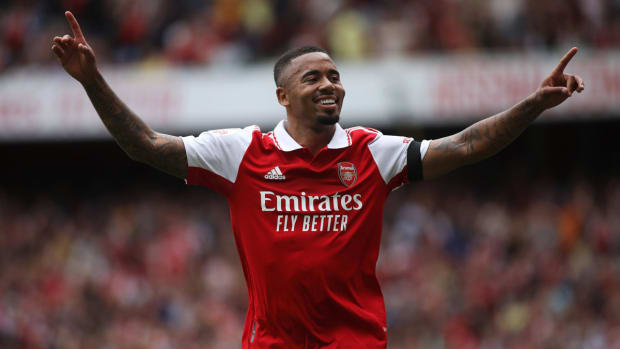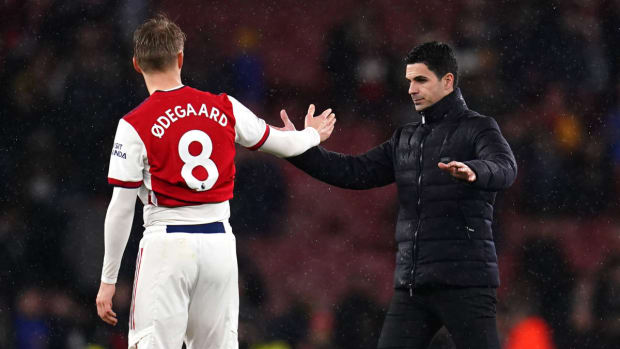Mikel Arteta has shaped his side some more, and the Gunners appear to be adhering to a plan—one that comes with growing pains and requires patience.
There is perhaps no Premier League team quite so susceptible to fluctuations of mood as Arsenal. Last season, it had five runs of four or more consecutive wins but also four runs of four or more games in which it won one game or fewer. In part that could be explained by the fixture list, and in part by injuries or other absences—but only in part. More than with any other side there was a sense with Arsenal last season that it was on a high or on a low and performances and results would follow accordingly. And that may be the hardest issue to for Mikel Arteta to sort out in his third full season as manager.
The evolution of the squad is continuing. Alexandre Lacazette has departed for Lyon. He was a fitful presence last season, managing only four league goals but creating space with his movement. The sense, though, was always that he wasn’t quite the right sort of forward for the sort of football Arteta wants to play.
His replacement, Gabriel Jesus, is a player Arteta knows well from his time working with Manchester City and is a smart and industrious presser. Jesus has seemingly now gone back on reservations he expressed in 2018 about playing as a center forward, but he is far more mobile than Lacazette and, even with the doubts about his finishing, should offer more than four goals this season. He has enjoyed a very promising preseason, scoring seven times in five appearances.

Joshua Smith/Uk Sports Pics Ltd/Imago Images
Arteta has also gone back to the City well to sign Oleksandr Zinchenko, the pair costing what seems like a very reasonable $90 million combined. Zinchenko is technically adept and versatile, and he seems more likely to play in midfield, where he operates for Ukraine, than at left back, where he spent much of his City career. The back of midfield was an area where Arsenal needed strengthening given how its performances notably dipped last season whenever Thomas Partey wasn’t available.
William Saliba has returned after an impressive season on loan at Marseille, which still hopes to sign him permanently. At 21, he is inexperienced, but should at least provide cover for Ben White and Gabriel should he stay. Fábio Vieira and Marquinhos are young creators who add further depth at the front end of the team.
But that also hints at Arsenal’s problem. This is a young squad. It has resale value. This is part of a five-year plan that was initiated in 2019. There is a logic to the recruitment that, frankly, was less evident when Arsenal was exciting fans with the expensive signings of Lacazette, Nicolas Pépé, even Mesut Özil. But that also perhaps guarantees a measure of inconsistency. Even Arteta is only 40. Arsenal’s new captain, Martin Ødegaard, is 23.

John Walton/PA Images/Imago Images
Yet there is one way in which Arsenal is all too consistent. Last season, it won three and lost seven of 10 league games against the other members of the “Big Six.” Losing against other big sides is a recurring problem. Against Manchester City and Liverpool, perhaps that is understandable, as they probably are a level above the rest. But if Arsenal is to break into the top four, as it would have done last season before a late collapse, it needs to be taking more than nine points from those 10 fixtures. That again seems like a matter of mentality as much as anything else. Although Arsenal beat Tottenham early in the season when Spurs were struggling under Nuno Espírito Santo, it was comprehensively beaten in the derby in the final week of the season.
There is a doublethink going on here, though. Arsenal finished fifth last season with a sense of disappointment, largely because of those defeats to Crystal Palace (Friday’s opponent in the Premier League curtain-raiser), Brighton and Southampton in early April and then Newcastle and Tottenham in the second- and third-to-last games of the season. But this probably is the fifth- or sixth-best squad in the division. Although wobbles from the other members of the “Big Six” could create opportunities, a failure to qualify for the Champions League should not necessarily be considered a wholesale failure.
The accountants and supporters may disagree, and Champions League revenue and status would clearly be a benefit for future development, but in football terms what matters this season is that Arsenal continues to develop along the path Arteta has laid out—and, most importantly, shows a little more backbone and fight, particularly in those games against the best. Another fifth-place finish could still yield progress, so long as there is greater consistency and less of a sense of Arsenal as a soft touch.
Watch live soccer with fuboTV: Start a free trial today.
More Soccer Coverage: